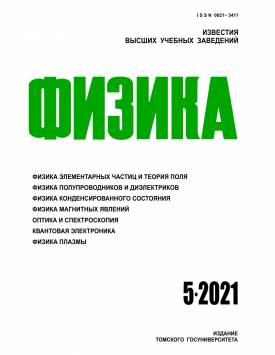Hydrogen isotope separation through bi-layer membranes
The quantum sieving mechanism through the bilayer membranes calculated on hydrogen isotopes is described. The technology for determining the potential energy of interaction of a monoatomic membrane is presented. The permeability of membranes obtained via the matrix method of solving the differential Schrödinger equation. It consists of using the linking technology at the boundaries of the calculated interval. The permeability of a bilayer graphidine membrane for hydrogen isotopes H2, D2, T2, HD is considered. The resonant regimes of the components passage are found and the conditions favorable for the separation of individual components from the mixture are determined. As a result, it has been shown that composite membranes are an effective way for isotope separation in the gas state at cryogenic temperatures.
Keywords
gas separation,
hydrogen,
deuterium,
tritium,
porous graphene,
graphdiyne,
compound membrane,
quantum tunneling,
resonance,
Schrödinger equationAuthors
| Poteryaeva V.A. | National Research Tomsk State University | valentina.poteryaeva@gmail.com |
| Bubenchikov M.A. | National Research Tomsk State University | m.bubenchikov@gtt.gazprom.ru |
Всего: 2
References
Gijón A., Campos-Martínez J., and Hernández M.I. // J. Phys. Chem. C. - 2017. - V. 121. - P. 19751-19757. https://doi.org/10.1021/acs.jpcc.7b04298.
Schrier J. // J. Phys. Chem. Lett. - 2010. - V. 1. - P. 2284-2287. https://doi.org/10.1021/jz100748x.
Poteryaeva V.A., Bubenchikov M.A., Bubenchikove A.M., and Lun-Fu A.V. // Sci. Rep. - 2020. - V. 10. - No 1. - P. 15631. https://doi.org/10.1038/s41598-020-72327-6.
Потеряева В.А. // Вестник ТГУ. Математика и механика. - 2020. - № 65. - C. 114-123. https://doi.org/ 10.17223/19988621/65/9.
Mandrà S., Schrier J., and Ceotto M. // J. Phys. Chem. A. - 2014. - V. 118. - P. 6457-6465. https://doi.org/10.1021/jp502548r.
Poteryaeva V.A., Bubenchikov M.A., Jambaa S., et al. // J. Phys.: Conf. Ser. - 2019. - V. 1537. - No. 012008. https://doi.org/10.1088/1742-6596/1537/1/012008.
Jin Z., Lu W., O’Neill K.J., et al. // Chem. Mat. - 2011. - V. 23. - No. 4. - P. 923-925. https://doi.org/10.1021/cm1025188.
Huang Q., Chen X., Lin J., et al. // J. Phys. Chem. C. - 2011. - V. 115. - No. 42. - P. 20538-20545. https://doi.org/10.1021/jp204723k.
Hauser A.W. and Schwerdtfeger P. // J. Phys. Chem. Lett. - 2012. - V. 3. - P. 209-213. https://doi.org/10.1021/jz201504k.
Li F., Qu Y., and Zhao M. // Carbon. - 2015. - V. 95. - P. 51-57. https://doi.org/10.1016/j.carbon.2015.08.013.
Qu Y. // Sci. Rep. - 2016. - V. 6. - No. 19952. https://doi.org/10.1038/srep19952.
Li G., Li Y., Liu H., et al. // Chem. Commun. - 2010. - V. 46. - No. 19. - P. 3256. https://doi.org/10.1039/b922733d.
Gao X., Liu H., Wang D., and Zhang J. // Chem. Soc. Rev. - 2019. - V. 48. - P. 908-936. https://doi.org/10.1039/c8cs00773j.
Bartolomei M., Carmona-Novillo E., Hernández M.I., et al. // J. Phys. Chem. C. - 2014. - V. 118. - No. 51. - P. 29966-29972. https://doi.org/10.1021/jp510124e.
Бубенчиков А.М., Бубенчиков М.А., Потекаев А.И. и др. // Изв. вузов. Физика. - 2015. - Т. 58. - № 7. - С. 10-15.
Poteryaeva V.A., Bubenchikov M.A., and Lun-Fu A. // AIP Conf. Proc. - 2020. - V. 2212. - No. 020048. https://doi.org/10.1063/5.0000939.
Perez-Carbajo J., Parra J.B., Ania C.O., et al. // ACS Appl. Mater. Interfac. - 2019. - V. 11. - No. 20. - P. 18833-18840. https://doi.org/10.1021/acsami.9b02736.
Niimura S., Fujimori T., Minami D., et al. // J. Am. Chem. Soc. - 2012. - V. 134. - No. 45. - P. 18483-18486. https://doi.org/10.1021/ja305809u.
